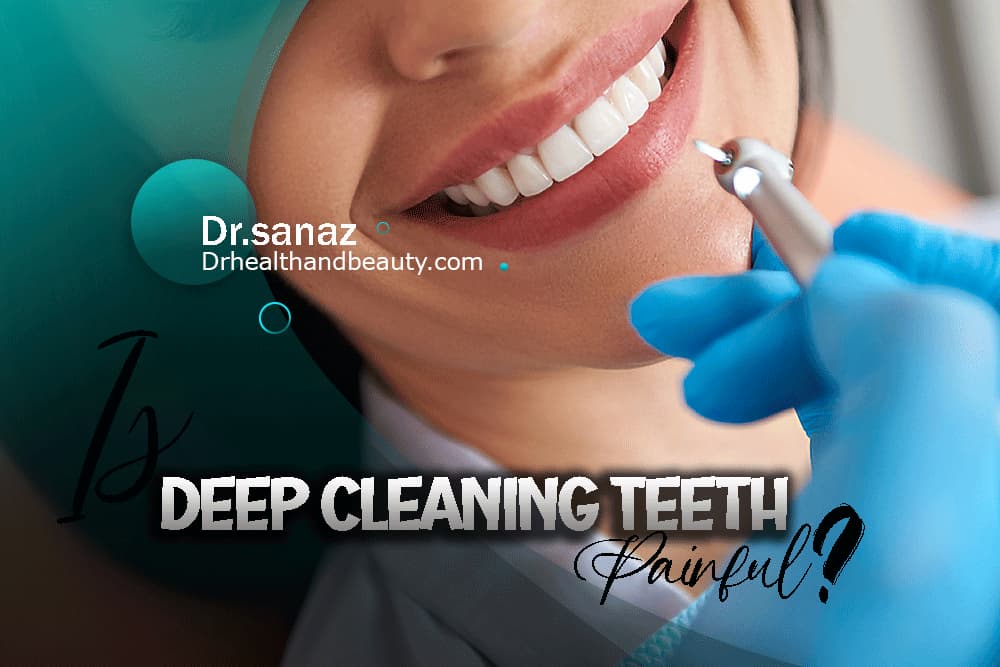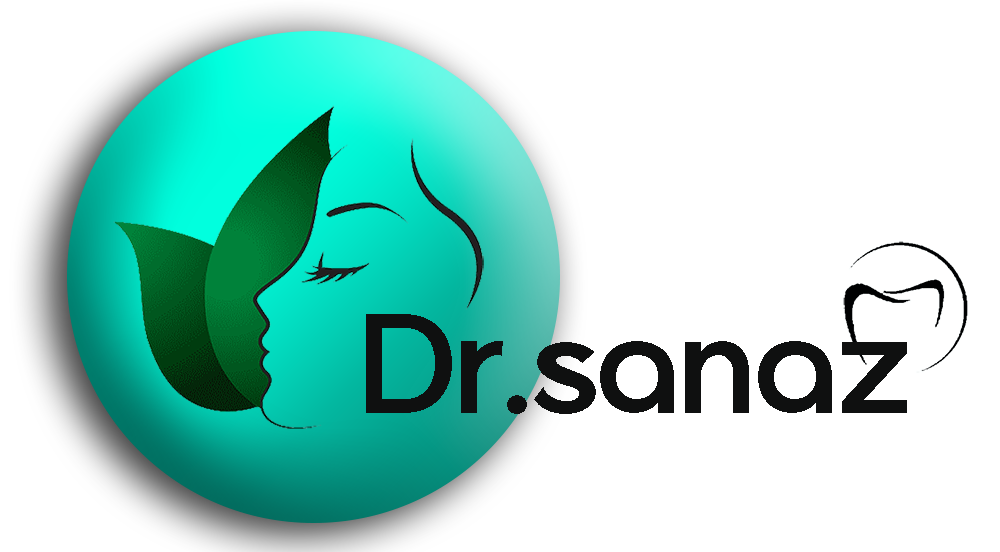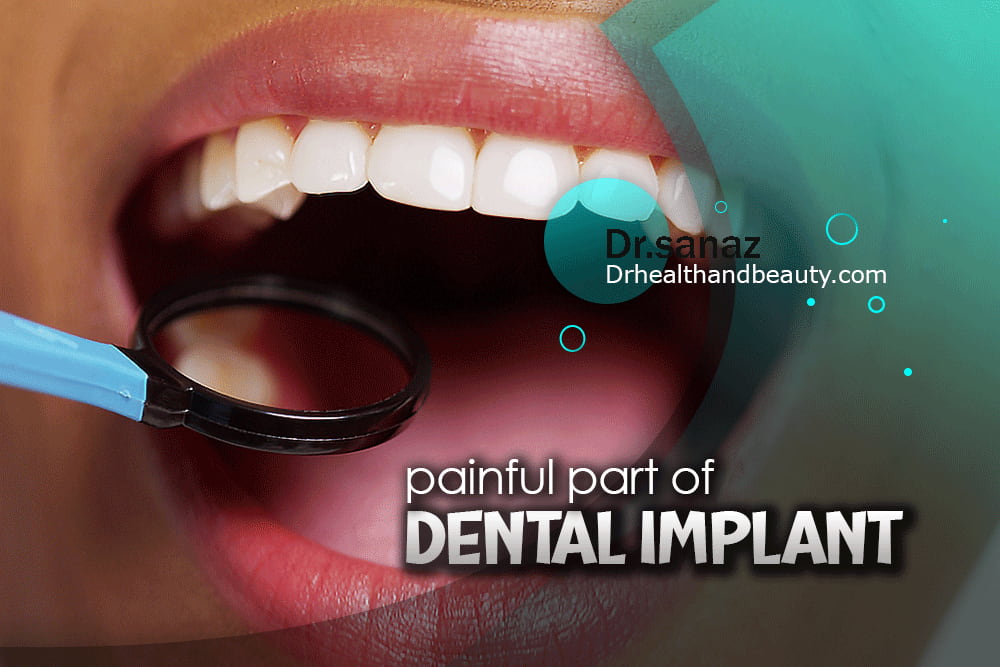
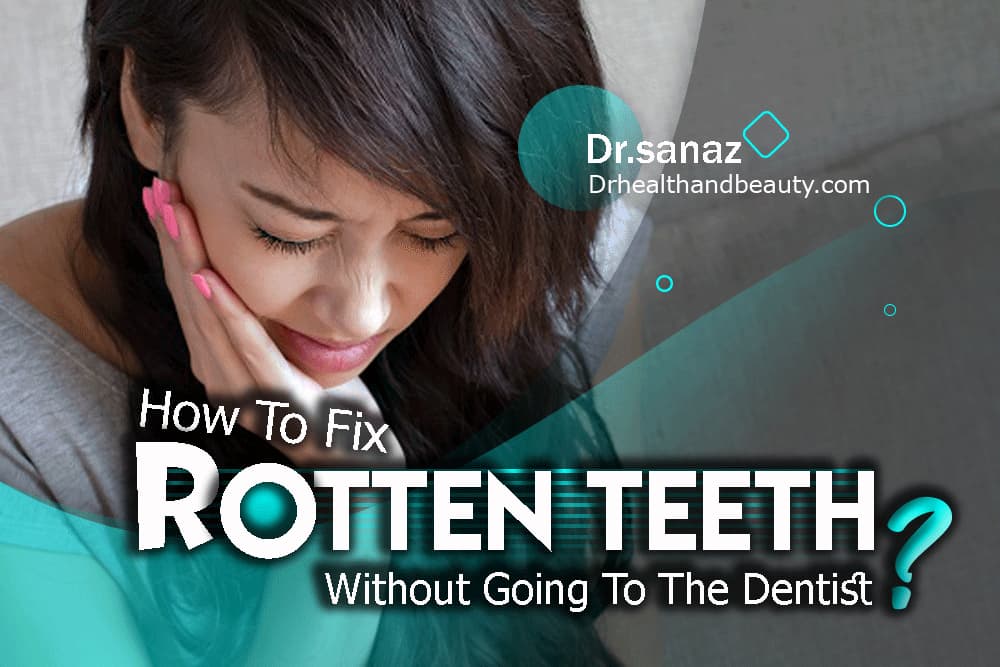
How To Fix Rotten Teeth Without Going To The Dentist?
Table of Contents
After the common cold, rotten teeth are the second most common problem of humans worldwide. If this caries is not controlled and treated, it will gradually cause pain, discomfort, loss of teeth, and sometimes even damage to gum and bone tissue. About a quarter of children between 2 and 5 years old and half of children between 12 and 15 years old in society struggle with this problem. Adults are also more likely to get rotten teeth as they age. Fortunately, this problem is straightforward to treat and even easier to prevent.
So if you are struggling with rotten teeth And you are looking for more economical and faster ways, Our comprehensive guide from drhealthandbeauty about fixing rotten teeth without a dentist will teach you simple and effective tips to improve the health of your teeth to help you achieve a brighter smile.”.

Why are your teeth rotting and breaking?
Your mouth is a balanced and dynamic ecosystem full of living bacteria (both good and bad). Most bacteria in your mouth are beneficial and good for your mouth and teeth. However, some of them are saboteurs. These destructive bacteria break down sugars and carbohydrates in food, turning them into acids that destroy tooth enamel and cause tooth decay.
With the analysis of tooth enamel, small and large holes will be created on the surface and depth of the tooth. The presence of cavities, discoloration, and other visible signs in the tooth are collectively called rotten teeth.
Rotten teeth often happen when carbohydrate-containing foods get stuck between the teeth and are not entirely removed by brushing and flossing. The main reasons for this problem are the consumption of sweet, sticky foods and harmful drinks. The more sweet things (containing sugar) are consumed, the more acid is produced, which leads to more decay.
Sugars combine with plaque in the mouth and weaken tooth enamel, leaving you vulnerable to tooth decay. Every time you eat a sugary snack, your teeth are exposed to acid damage for 20 minutes.

- Other causes of rotten teeth include:
- Poor oral hygiene
- Plaque formation and its hardening
- Decreased salivation
- Dry mouth syndrome
- Consumption of acidic and delightful, and carbonated foods
- Neck and face radiation therapy
- Some specific diseases
- Taking certain medications
Related: “Top 10 Root Causes Of Dental Pain“

What is tooth decay vs cavity?
When there is a hole in the enamel of your damaged tooth, bacteria can penetrate the inner layers of the dentin and pulp, and once they get there, the infection can spread quickly. The hole created in the tooth is called a cavity.
In simpler terms, we can define a dental cavity as a hole in the tooth that forms when decay is left untreated to spread. It only takes a small hole in the tooth to form a large cavity.
If the cavity extends to the pulp of the decayed tooth, it will cause inflammation of the pulp and begin to destroy the nerves and blood vessels; in the end, the decayed tooth itself will disappear and change color.
Bacteria can cause the formation of a tooth abscess in a decayed tooth or the surrounding gum tissue; this infection may eventually spread to other parts of the body through blood flow and cause serious health problems.
What are the most common teeth to rot?
Caries do not affect all teeth and tooth surfaces equally. Instead, some surfaces of the teeth are more prone to decay due to their particular condition. These levels are:
1- Grooves on the chewing surface of the back teeth
There are many grooves on the chewing surface of the teeth. Also, the teeth contain several indented points. Some molars have depressions on their lateral surface, usually from rotten teeth. You can see these indented points on the lingual surface of the upper molars and the buccal surface of the lower molars.
2- The surface between the teeth
In a normal state, all the teeth are in contact with each other from the side, except for the teeth located at the end of the mouth. Accessing the toothbrush in the area between the teeth is complex, and it is not easy to clean plaque and tartar. Therefore, this place is very suitable for accumulating plaque and bacteria and, as a result, decay, mainly if you are not used to flossing daily.
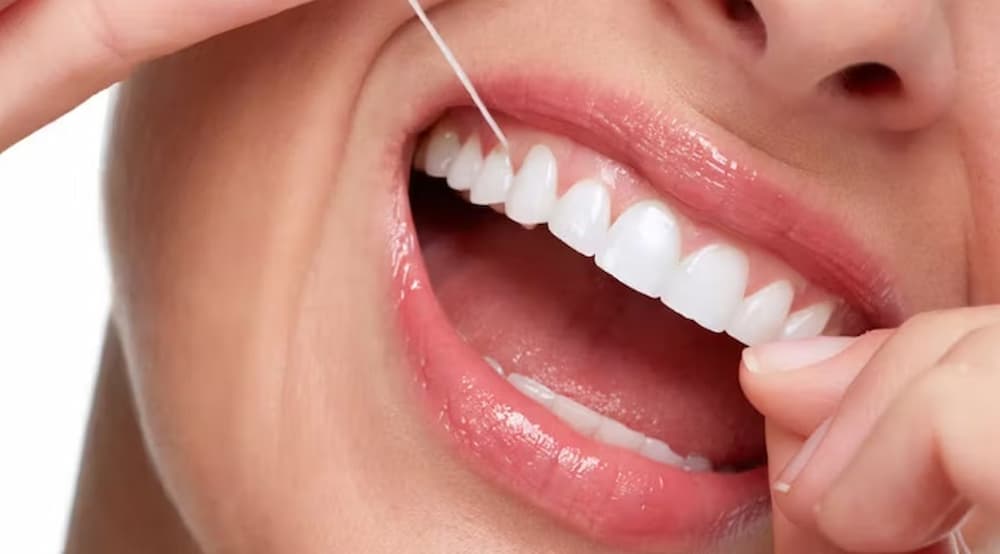
3- In the margins of fillings, veneers, breech, and other dental restorations
Sometimes the contact surface of the tooth and the restoration part is not smooth enough. For this reason, this area may quickly provide a place to accumulate mass and sediment.
4- Gum border
The surface of the teeth at the junction with the gums is one of the common areas where tooth decay begins. If you do not brush and floss properly, this area becomes a place of accumulation of mass and plaque.
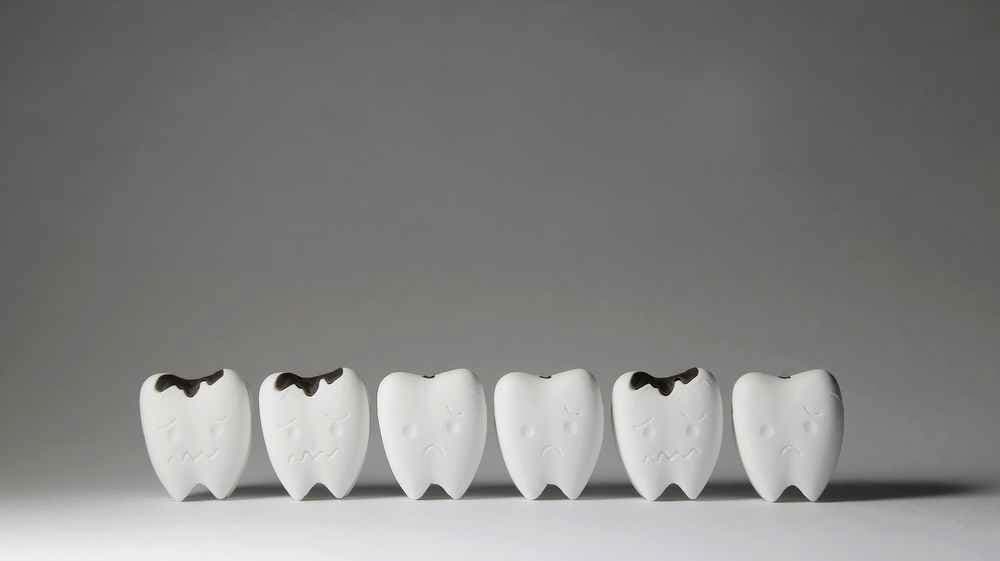
5- Tooth roots
If your gums are sick and have inflammation and infection (gum disease like Gingivitis is the first cause of tooth loss), the gums and bone around the tooth will gradually weaken and regress. This situation makes the root surface of the teeth visible. The root part of the tooth is much softer than the tooth enamel, and if it is exposed and attacked by bacteria, it will decay very quickly. For this reason, it is essential to identify gum disease in the early stages because it is much easier and more successful to treat it without damaging the roots of the teeth.
6- Teeth adjacent to artificial teeth
Food particles can easily get trapped between your dentures and your teeth. In addition, semi-complete dentures usually have a metal hook that hooks onto the adjacent natural tooth to hold the denture firmly in place. This place is perfect for the accumulation and growth of bacteria and plaque. If you have partial dentures, ask your dentist how to brush and clean your teeth.

What are the worst types of cavities?
As said, the specialist must understand how far the rotten teeth have progressed during the restoration and treatment of cavities and tooth decay. Therefore, according to what was said, in general, we have three types of rotten teeth:
- Plaque formation on the surface of the teeth
Sometimes only plaques are formed on the teeth, which are caused by the activity of bacteria, and severe tooth decay has not yet occurred. If these plaques are removed from the teeth, the risk of decay will also be removed.

- Plaque attacks tooth tissue and creates cavities.
Suppose these plaques remain on the tooth due to the secretion of acid caused by the activity of bacteria. In that case, surface decay will gradually occur in the tooth enamel, and the dentin will become very soft and fragile. At this stage, you are actually at the beginning of tooth decay. In such a situation, the specialist should remove the rotten part and fill the space with suitable materials.
- Continuous decay in the tooth and a deep cavity
However, unfortunately, if the acid in the plaque advances and reaches the nerve channels and dental pulp, conditions are created for damage to the tooth’s nerves and infection in the root, and it will be the worst type of tooth decay.
Related “Tooth Infection Swelling“

Why are all my teeth decaying at once?
here are some main reasons for teeth decaying all at once:
- Poor oral hygiene
- Poor diet and eating habits
- Lack of regular dental checkups
- Genetics
- Chronic medical conditions like diabetes or cancer
Improper diet can be the leading cause of holes or cavities in the teeth or their so-called decay. However, a proper diet can prevent sudden teeth grinding and such complications.
Tooth enamel is softer and more sensitive than other parts of the tooth, which is responsible for protecting the dentin and dental pulp. Tiny crystals of calcium and other minerals make up tooth enamel. When eating sweet and sticky food. Moreover, please do not wash your teeth; these substances stay on the tooth enamel for a long time, and plaque bacteria turn them into acid over time. That this acid is dissolved in tooth enamel. And causes decay.
Related: “One Tooth Sensitive To Cold“
We are less likely to suffer from rotten teeth and tooth loss with advancing health and oral health care. However, despite paying attention to proper hygiene and proper diets, this problem still needs to be addressed.

Can you restore rotten teeth?
In general, teeth are classified into five stages in terms of decay:
- Completely healthy teeth
- Initial visible enamel changes
- Destruction of enamel without the involvement of dentin
- Dentin involvement without tooth decay
- Dentin involvement with cavities
In case number 2, the dentist will decide on the restoration based on the condition of caries, whether it is active and progressing caries or inactive.
Although this type of decay is not serious, it should not be ignored because it can lead to more serious problems if not treated properly. And it is important to note that superficial tooth decay cannot be reversed without the help of a dentist.
From caries number 3 onwards, restoration will definitely be necessary and the dentist will do it.
Why should rotten teeth be repaired?
Decayed teeth contain bacteria, and these bacteria cause the spread of decay by multiplying. The speed of this expansion depends on the level of oral and dental hygiene, such as toothbrushes and dental floss, as well as the location of the decay and the individual’s genetics. If action is not taken as soon as possible to prevent the spread of decay, this decay will involve the tooth nerve, and root canal treatment will be needed to remove bacteria from the tooth canal. Also, the formation of an abscess is one of the complications of the spread of tooth decay infection. It is necessary to remove caries to prevent their spread and to fill the caries removal area to prevent the re-accumulation of bacteria in that place.

Five magical ways to fix rotten teeth at Home
There are various home remedies for tooth decay, and in this article, we will review five home remedies.
- 1. Brine
That is right; this simple and common solution can help prevent and fix rotten teeth. In fact, by using salt water, bacteria can be removed from the mouth. To use this solution, add a teaspoon of salt to a glass of warm water. After mixing these two ingredients, gargle the salt water in your mouth. This will remove the bacteria from the surface of your teeth, and the salt water from your mouth will also be removed from your mouth.
We suggest that you do this once or twice a day.

- 2. Green tea
Green tea is another home remedy for treating rotten teeth. In fact, by using green tea, you can remove the microbes inside the mouth. To consume this green tea, prepare it first, then add honey and lemon juice. It is better to drink green tea warm and lukewarm, like black tea. Consuming this green tea two or three times a day can be very effective in the health of your teeth.
- 3. clove oil
All clove products, including clove oil, help treat caries and control toothache. Clove oil has eugenol, which acts as a pain reliever. Also, this oil prevents the growth of viruses, fungi, and bacteria. To use this clove oil, it is better to pour some clove oil on your finger and then rub your finger on the decayed tooth or tooth cavity. You can also use a clean ear cleaner to do this. It is better to do this about two or three times a day.
Related: “How Do I Know What Kind Of Toothache I Have?“

- 4. Eucalyptus oil
Eucalyptus oil is one of the most famous oils whose antibacterial properties make it recommended for preventing and treating rotten teeth. To use this oil, you must add this oil to your toothpaste. Continue using this toothpaste until your tooth decay is cured.
- 5. neem
The neem plant is a very famous plant for oral health and gums. To consume this plant, it is chewed inside the mouth, which makes the teeth and gums stronger. Also, this plant has antibacterial properties and therefore prevents your teeth from rotting, and because it has much fiber, it prevents the formation of any dental plaque. To consume this plant, it is better to chew it and then rinse your mouth with water. Of course, some people also use neem oil to massage their gums and teeth, which cleans and strengthens their teeth.
If you are still facing the problem of cavities even after doing these steps, you should consult a doctor. These methods may not answer your question of how to get rid of cavities in one day, but they will ensure they stay manageable. Moreover, they also prevent the creation of new cavities. They help remineralize weak and soft areas of tooth enamel. When the cavity is detected, visiting the dentist as soon as possible is better.
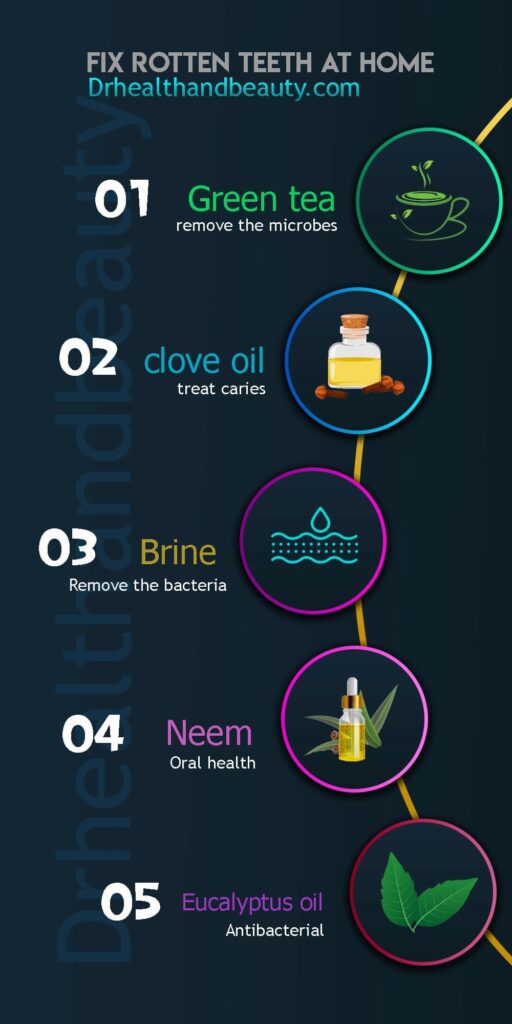
Conclusion
Rotten teeth are one of the most common complications that can happen to most people.
In tooth decay, the surface and enamel of the tooth or the outer layer of the tooth are damaged. Tooth decay can be due to various reasons. Among the most important causes of tooth decay are lack of hygiene and regular brushing, aging, lack of calcium in the body, use of harmful food, etc. In some cases, tooth decay related to toothache causes bad breath, which creates an unpleasant feeling in the person and others.
Share in :
Explore more

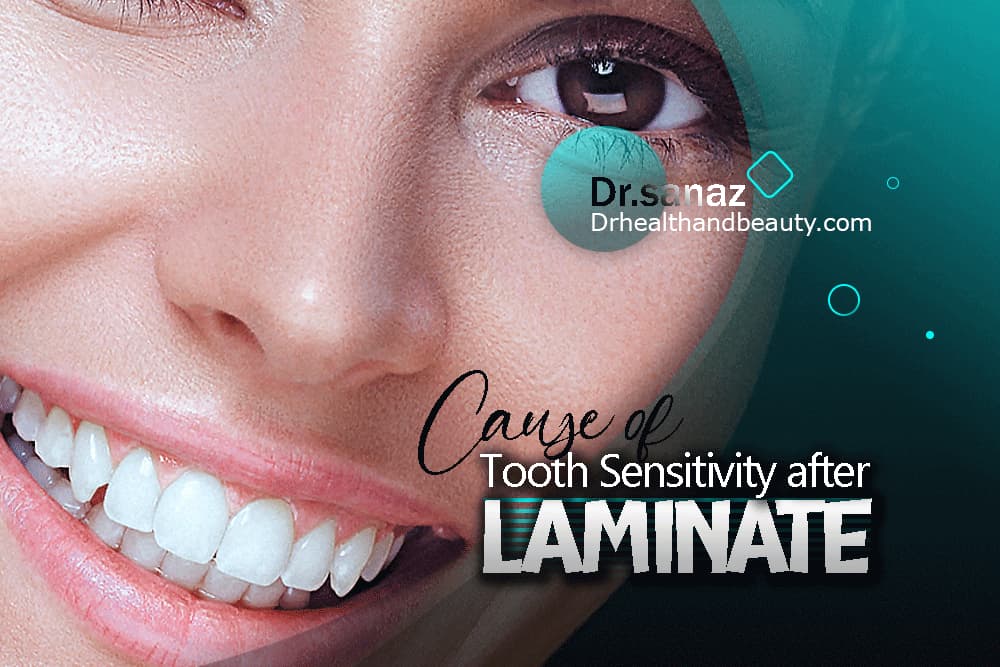
What Is The Cause Of Tooth Sensitivity After Laminate?- Drhealthandbeauty
